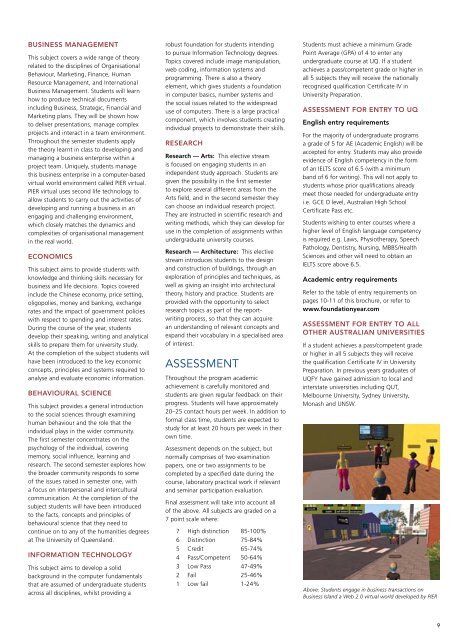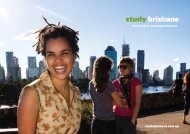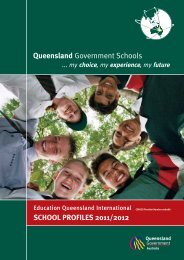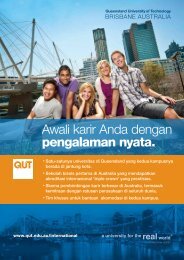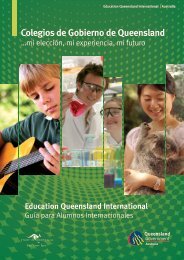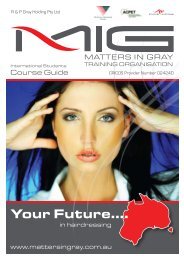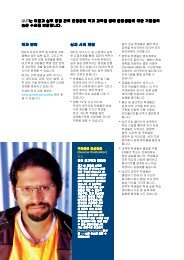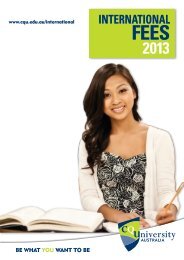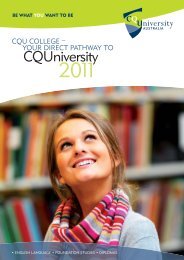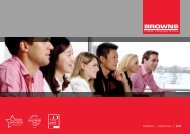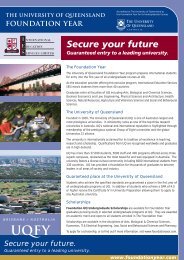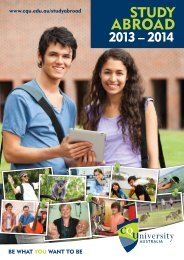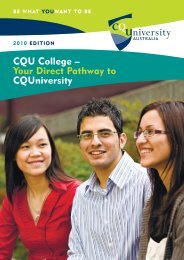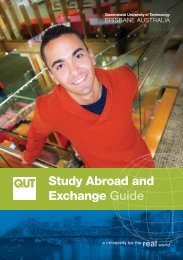The Foundation Year 2010-2011 THE FOUNDATION YEAR
The Foundation Year 2010-2011 THE ... - Study Brisbane
The Foundation Year 2010-2011 THE ... - Study Brisbane
You also want an ePaper? Increase the reach of your titles
YUMPU automatically turns print PDFs into web optimized ePapers that Google loves.
BUSINESS MANAGEMENT<br />
This subject covers a wide range of theory<br />
related to the disciplines of Organisational<br />
<br />
Resource Management, and International<br />
<br />
how to produce technical documents<br />
<br />
Marketing plans. <strong>The</strong>y will be shown how<br />
to deliver presentations, manage complex<br />
projects and interact in a team environment.<br />
Throughout the semester students apply<br />
the theory learnt in class to developing and<br />
managing a business enterprise within a<br />
project team. Uniquely, students manage<br />
this business enterprise in a computer-based<br />
virtual world environment called PIER virtual.<br />
PIER virtual uses second life technology to<br />
allow students to carry out the activities of<br />
developing and running a business in an<br />
engaging and challenging environment,<br />
which closely matches the dynamics and<br />
complexities of organisational management<br />
in the real world.<br />
ECONOMICS<br />
This subject aims to provide students with<br />
knowledge and thinking skills necessary for<br />
business and life decisions. Topics covered<br />
include the Chinese economy, price setting,<br />
oligopolies, money and banking, exchange<br />
rates and the impact of government policies<br />
with respect to spending and interest rates.<br />
During the course of the year, students<br />
develop their speaking, writing and analytical<br />
skills to prepare them for university study.<br />
At the completion of the subject students will<br />
have been introduced to the key economic<br />
concepts, principles and systems required to<br />
analyse and evaluate economic information.<br />
BEHAVIOURAL SCIENCE<br />
This subject provides a general introduction<br />
to the social sciences through examining<br />
human behaviour and the role that the<br />
individual plays in the wider community.<br />
<strong>The</strong> first semester concentrates on the<br />
psychology of the individual, covering<br />
memory, social influence, learning and<br />
research. <strong>The</strong> second semester explores how<br />
the broader community responds to some<br />
of the issues raised in semester one, with<br />
a focus on interpersonal and intercultural<br />
communication. At the completion of the<br />
subject students will have been introduced<br />
to the facts, concepts and principles of<br />
behavioural science that they need to<br />
continue on to any of the humanities degrees<br />
at <strong>The</strong> University of Queensland.<br />
INFORMATION TECHNOLOGY<br />
This subject aims to develop a solid<br />
background in the computer fundamentals<br />
that are assumed of undergraduate students<br />
across all disciplines, whilst providing a<br />
robust foundation for students intending<br />
to pursue Information Technology degrees.<br />
Topics covered include image manipulation,<br />
web coding, information systems and<br />
programming. <strong>The</strong>re is also a theory<br />
element, which gives students a foundation<br />
in computer basics, number systems and<br />
the social issues related to the widespread<br />
use of computers. <strong>The</strong>re is a large practical<br />
component, which involves students creating<br />
individual projects to demonstrate their skills.<br />
RESEARCH<br />
Research — Arts: This elective stream<br />
is focused on engaging students in an<br />
independent study approach. Students are<br />
given the possibility in the first semester<br />
to explore several different areas from the<br />
Arts field, and in the second semester they<br />
can choose an individual research project.<br />
<strong>The</strong>y are instructed in scientific research and<br />
writing methods, which they can develop for<br />
use in the completion of assignments within<br />
undergraduate university courses.<br />
Research — Architecture: This elective<br />
stream introduces students to the design<br />
and construction of buildings, through an<br />
exploration of principles and techniques, as<br />
well as giving an insight into architectural<br />
theory, history and practice. Students are<br />
provided with the opportunity to select<br />
research topics as part of the reportwriting<br />
process, so that they can acquire<br />
an understanding of relevant concepts and<br />
expand their vocabulary in a specialised area<br />
of interest.<br />
ASSESSMENT<br />
Throughout the program academic<br />
achievement is carefully monitored and<br />
students are given regular feedback on their<br />
progress. Students will have approximately<br />
<br />
formal class time, students are expected to<br />
study for at least 20 hours per week in their<br />
own time.<br />
Assessment depends on the subject, but<br />
normally comprises of two examination<br />
papers, one or two assignments to be<br />
completed by a specified date during the<br />
course, laboratory practical work if relevant<br />
and seminar participation evaluation.<br />
Final assessment will take into account all<br />
of the above. All subjects are graded on a<br />
7 point scale where:<br />
7 High distinction 85-100%<br />
6 Distinction 75-84%<br />
5 Credit 65-74%<br />
4 Pass/Competent 50-64%<br />
3 Low Pass 47-49%<br />
2 Fail 25-46%<br />
1 Low fail 1-24%<br />
Students must achieve a minimum Grade<br />
Point Average (GPA) of 4 to enter any<br />
undergraduate course at UQ. If a student<br />
achieves a pass/competent grade or higher in<br />
all 5 subjects they will receive the nationally<br />
recognised qualification Certificate IV in<br />
University Preparation.<br />
ASSESSMENT FOR ENTRY TO UQ<br />
English entry requirements<br />
For the majority of undergraduate programs<br />
a grade of 5 for AE (Academic English) will be<br />
accepted for entry. Students may also provide<br />
evidence of English competency in the form<br />
of an IELTS score of 6.5 (with a minimum<br />
band of 6 for writing). This will not apply to<br />
students whose prior qualifications already<br />
meet those needed for undergraduate entry<br />
i.e. GCE O level, Australian High School<br />
Certificate Pass etc.<br />
Students wishing to enter courses where a<br />
higher level of English language competency<br />
is required e.g. Laws, Physiotherapy, Speech<br />
<br />
Sciences and other will need to obtain an<br />
IELTS score above 6.5.<br />
Academic entry requirements<br />
Refer to the table of entry requirements on<br />
pages 10-11 of this brochure, or refer to<br />
www.foundationyear.com<br />
ASSESSMENT FOR ENTRY TO ALL<br />
O<strong>THE</strong>R AUSTRALIAN UNIVERSITIES<br />
If a student achieves a pass/competent grade<br />
or higher in all 5 subjects they will receive<br />
the qualification Certificate IV in University<br />
Preparation. In previous years graduates of<br />
UQFY have gained admission to local and<br />
interstate universities including QUT,<br />
Melbourne University, Sydney University,<br />
Monash and UNSW.<br />
Above: Students engage in business transactions on<br />
Business Island a Web 2.0 virtual world developed by PIER<br />
9


